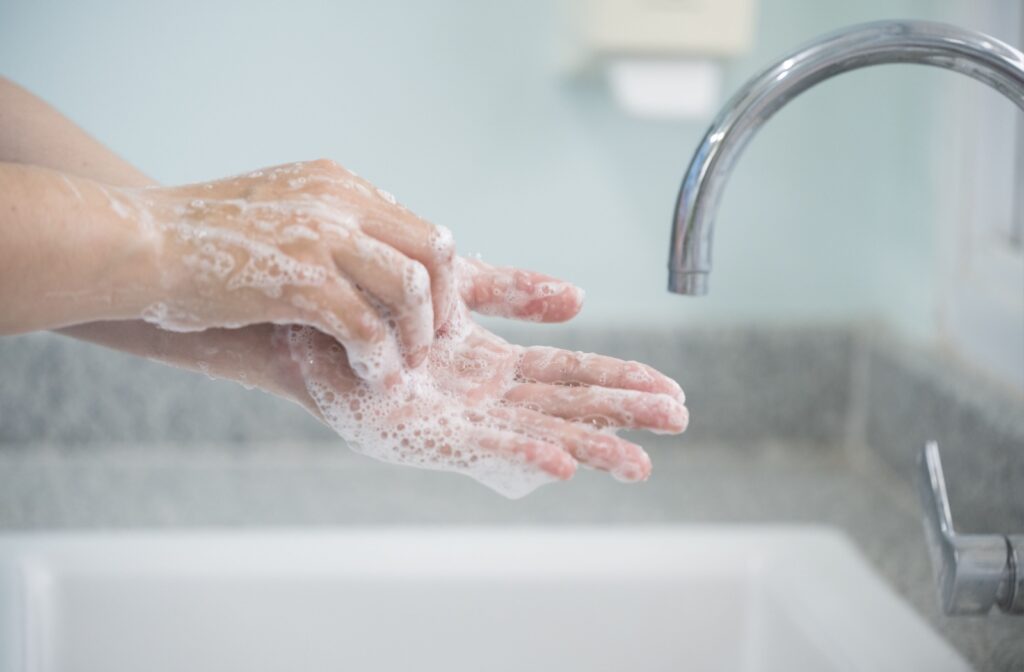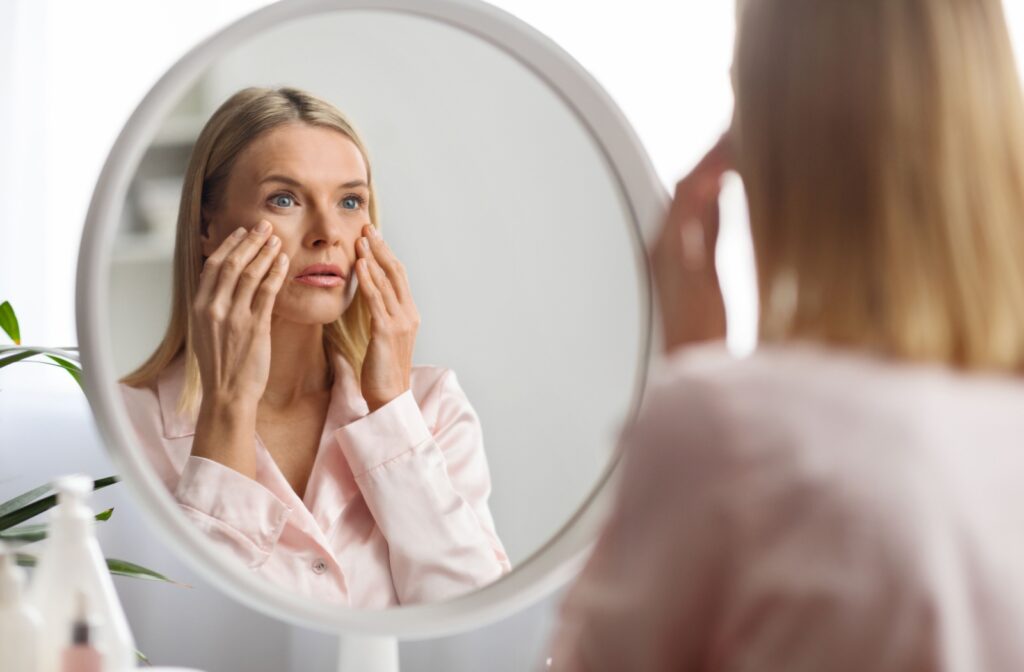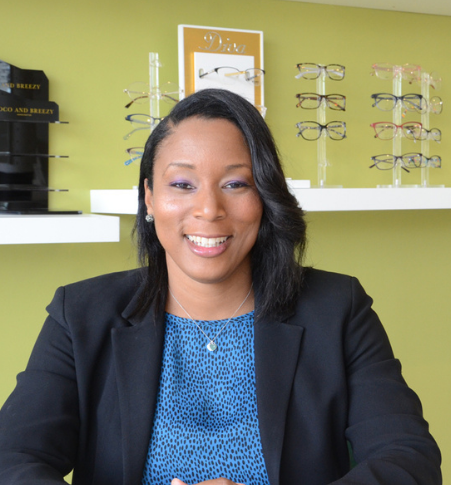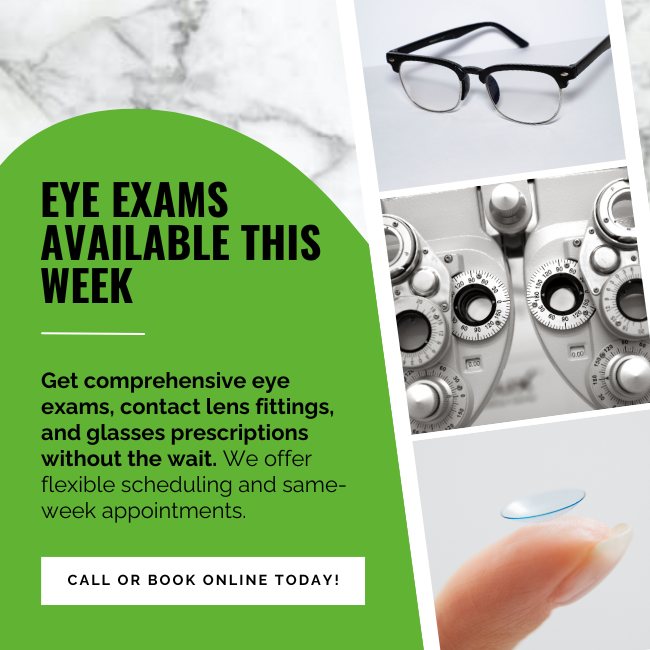Scleral lenses can be an appropriate treatment option for people with severe dry eye, high refractive errors, and other eye conditions. These lenses are a little different from other contact lenses: they cover a wider surface area and lie on the white part (sclera) of your eye.
However, they also require careful and consistent care because the “pocket” that holds fluid between the lens and the cornea can harbor debris.
With proper care, scleral lenses can generally be expected to last 1–2 years. Stick to care and cleaning best practices: always wash your hands before handling your lenses and never use any fluid other than the prescribed solution to clean them.
What Are Scleral Lenses?
Scleral lenses are wider lenses that lie on the sclera, which is the white part of your eye, and are held under your top and bottom eyelids. A scleral lens also curves over the cornea without touching it, leaving a gap that can hold liquids against your cornea, the clear, dome-shaped layer on top of your eye.
The unique design of scleral lenses makes them suitable to treat a variety of eye conditions, such as:
- High refractive errors, such as high myopia (nearsightedness) prescriptions
- Severe dry eye disease
- Conditions affecting the eye surface, eyelid, and area around the eye
- Diseases of the cornea, such as keratoconus
- Damage and scarring of the cornea
- Conditions that require a medicated liquid to be held against the surface of your eye
How Long Do Scleral Lenses Last?
According to the Scleral Lens Education Society, most scleral lenses should last at least 1 year with proper care. You can generally expect your lenses to last 1–2 years. For a more accurate estimate based on your eye condition and lenses, ask your optometrist.
Factors That Affect How Long Scleral Lenses Last
Several factors may affect how well your scleral lenses hold up. These include:
- Frequency of use: More frequent use may require more frequent scleral lens replacement, especially if daily cleaning isn’t thorough.
- Health of your eyes: The eye condition you’re treating with scleral lenses may impact the frequency of use and how often the lenses require replacement.
- Environmental factors: The fluid-holding gap between the lens and your eye can hold debris. If not cleaned properly, these can cause lens clouding or surface damage over time.
- Care and cleaning: Because scleral lenses can trap debris, most people need to take out their lenses and clean them at least once per wear. Never use a cleaning solution other than the one prescribed by your optometrist. Doing so may damage the lens.

How to Care for Scleral Lenses
To get the most benefit out of your scleral lenses, clean them properly and consistently. Your optometrist should guide you on how to handle, clean, wear, and remove your scleral lenses. Here are other general tips to keep in mind:
- Handle with clean hands: Always thoroughly wash and dry your hands before handling your contact lenses. This will help you avoid infections and other complications.
- Regularly clean your contacts: Most people who wear scleral lenses will need to take them out and clean them at least once per wear.
- Never use alternative solutions: Only use your prescribed solution to clean your contacts. Do not ever use tap water. Tap water can contain harmful organisms, and unsuitable contact solutions can damage the lenses. You should also never reuse old solutions.
- Take care of your case: In general, contact lens cases should be replaced every 3 months and cleaned after every use, then stored open and dry.
- Follow up with your optometrist: Make sure you keep up with your optometrist’s recommended schedule of check-ups to monitor the status and progress of your eye health.
When to Replace Scleral Lenses
If you notice any of the following signs, discontinue use and consult your eye care provider:
- Visible damage such as chips, cracks, or breaks, which can scratch the eye or cause discomfort
- Debris that cannot be removed
- Changes in your vision
You should also see your optometrist if you notice the following:
- Feeling like your lenses don’t fit or that they’re frequently shifting from where they’re supposed to be
- Any changes in how you see while wearing your lenses
- Difficulty removing your lenses
If you experience pain or discomfort, remove your lenses as soon as possible and see your optometrist.
See If Scleral Lenses Are Right For You
While it’s true that scleral lenses require a little extra effort to properly care for, they are a treatment option for several eye conditions, in some cases even delaying or eliminating the need for surgery. They can also offer freedom from glasses for people with high refractive errors.
If you’re curious about whether scleral lenses (or other types of contact lenses) are right for you, the first step is getting a contact lens exam and fitting from an optometrist. During your appointment, your optometrist will assess your candidacy for contact lenses and explore which types of contact lenses will suit your eye condition. With 2 locations in Jacksonville and Orange Park to serve you, our optometrists at River City Vision Center can help. Book an appointment with us today.





